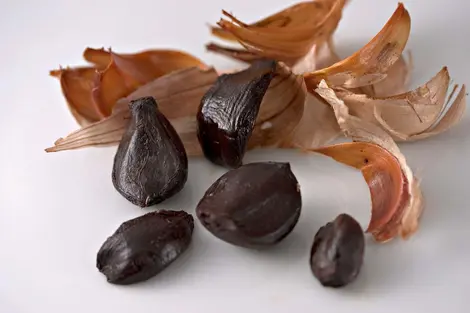Kuro ninniku, black garlic
Both medicine and food
The true origins of black garlic are unknown. According to some sources, it originated in Korea more than 4,000 years ago. According to others, in Japan. Wherever it came from, black garlic is a very popular ingredient in East Asian cuisine, especially in Japan where it is considered a functional food (a food with health benefits).
Black garlic produced in the Land of the Rising Sun is interesting, as it has developed a very elaborate production technique. This food has become world-famous thanks to recent scientific research that has revealed its exceptional virtues.
A slow manufacturing process
Black garlic, kuro ninniku in Japanese, is ordinary garlic (of the allium sativum variety) where the whole heads have been aged under specialised conditions - heated at low temperature, between 60 to 77°C (140 to 170°F), with a humidity level of 70% to 90%, for at least 2 weeks and up to 60 days. The transformation of taste, texture and color of the garlic cloves is a result of this very slow caramelization, known as the 'Maillard reaction', a chemical reaction between sugars and proteins that occurs during the cooking of a food. While the cloves take on a charcoal color, the outer peel remains white.
An exceptional taste
The taste of black garlic is very subtle and reminiscent of balsamic vinegar and licorice. The cooking method reduces its allicin content, and black garlic is much softer than white garlic and its texture is very smooth. For the Japanese it showcases umami, "the fifth flavor".
To read : Umami
Extraordinary medicinal benefits
It was a Japanese researcher, Professor Jin-ichi Sasaki, who first demonstrated the health benefits of black garlic and has helped contribute to its popularity. People were already aware of the benefits of white garlic, but the amount of antioxidants contained is increased tenfold once the garlic is "caramelized". It is also much more easily absorbed by the body.
Its antioxidant action helps fight against free radicals, strengthens the immune system and prevents the toxicity of drugs. Its S-Allyl cysteine content helps reduce cholesterol, triglyceride levels, lower blood pressure, and increase good cholesterol. It also helps fight some cancers.
In short, it's good for you, and regular consumption of black garlic is recommended by the WHO.
In Japan and abroad, it is sold as a bulb or in cloves, fresh or dried, and also in the form of dietary supplements like tablets. Its cloves can be eaten with both savory and sweet dishes, or can be enjoyed as is, as a tasty treat that could also be considered an elixir of youth...

A clove of black garlic
Creative Commons CC0.
L'ail noir d'Aomori : un produit d'exception
Parmi les différentes variétés de kuro ninniku, l'ail noir d'Aomori se distingue comme un produit d'exception. Voici ce qui fait sa renommée :
Terroir unique : La préfecture d'Aomori, située à l'extrême nord de l'île principale du Japon, Honshu, bénéficie d'un climat et d'un sol particulièrement propices à la culture de l'ail. Entourée par la mer sur trois côtés, cette région offre des conditions idéales pour la production d'un ail de haute qualité.
Savoir-faire traditionnel : Les producteurs d'Aomori ont développé un processus de fabrication minutieux, combinant des techniques traditionnelles et des méthodes modernes. L'ail est souvent confit dans de l'eau de mer pure, puisée en profondeur, ce qui contribue à sa saveur unique.
Qualité supérieure : L'ail noir d'Aomori est réputé pour sa texture particulièrement fondante et sa saveur complexe. Il présente souvent des notes plus prononcées d'umami et une douceur remarquable.
Reconnaissance internationale : Apprécié par les chefs du monde entier, l'ail noir d'Aomori est considéré comme une référence en matière de kuro ninniku. Il est souvent utilisé dans la haute gastronomie pour apporter une touche d'exotisme et de raffinement aux plats.
Bienfaits pour la santé : Les recherches menées notamment par le professeur Jin-ichi Sasaki ont mis en lumière les propriétés nutritionnelles exceptionnelles de l'ail noir d'Aomori. Il serait particulièrement riche en composés antioxydants et en S-allyl-cystéine.
Production contrôlée : La production d'ail noir à Aomori fait l'objet d'un contrôle rigoureux de qualité, garantissant la constance et l'excellence du produit. Certains producteurs ont même obtenu des certifications biologiques.
L'ail noir d'Aomori représente ainsi le summum de la qualité en matière de kuro ninniku. Bien que plus coûteux que d'autres variétés, il offre une expérience gustative unique et des bienfaits santé reconnus, ce qui en fait un produit recherché par les connaisseurs et les amateurs de gastronomie japonaise.
Pour découvrir davantage de spécialités culinaires japonaises, n'hésitez pas à consulter nos articles sur la cuisine japonaise.














